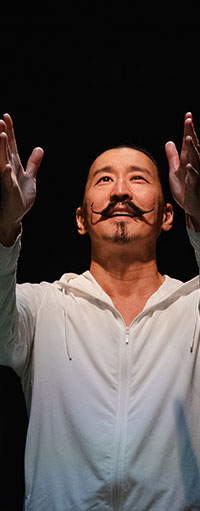
 |
 |
|
Dates
and Venue September 28 - October 21 7:30 pm, Wed. - Thurs.,
8:00 pm Fri. / Sat. with 2 pm Sat. and Sun. matinees | Pacific Theatre,
1440 W 12th Avenue, Vancouver ‘You could say we’ve gone “a cappella”, Tetsuro Shigematsu writes in the programme note for Empire of the Son. Starting a run at Pacific Theatre, his one man show is stripped bare of its previous whistles and bells. How difficult it is to imagine the prior production - simplicity is its strength. Set
with only a waterfall of origami birds and a desk and chair, the
stage is restrained but arresting. The fourth wall is absent; through
engaged storytelling, comic bits, and uses of multimedia, Shigematsu
takes us through the life and death of his father. Moving from Japan
to England and then Canada, Akira has had a lifetime of big moments.
Tea with the Queen, audience to Monroe’s Happy Birthday rendition
for JFK, and witness to the blinding horror of Hiroshima, to name
a few. Arika’s resistance to aggrandise them is just one of
the ways he differs from his son. Not only divided by generation,
but also culture and personality – Akira reserved, undramatic;
Tetsuro a vivacious performer – the men often live in disconnect.
Yet their similarities are unique and undeniable too: careers in
radio broadcasting as well as an inability (or indoctrinated refusal)
to cry.
|
||||||||||||||||||||||||||||||||||||||||
|
|
||||||||||||||||||||||||||||||||||||||||||
|
|
||||||||||||||||||||||||||||||||||||||||||
|
|
||||||||||||||||||||||||||||||||||||||||||